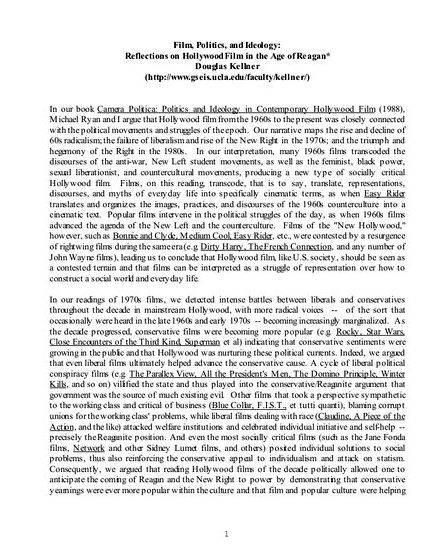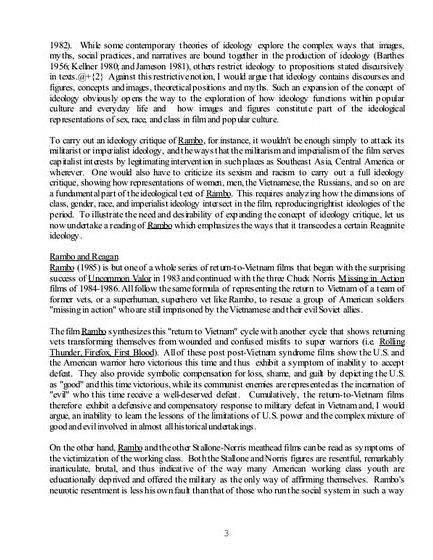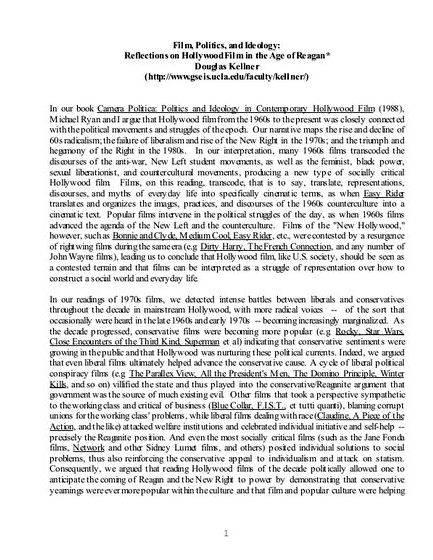IDEOLOGY Prof. West
What was an ideology? Does it mean Idiotism? The Science of Non Compos Menticism? The Science of Lunacy?The Theory of Delerium?
An ideology is a system of ideas which attempts to explain reality. Ideologies are developed because reality is often too complex to be understood. They also, almost always, reflect a bias and serve the interests of a particular group. Some ideologies are well grounded in reality, while others are completely divorced from reality and can only be explained in terms of the emotional and psychological motivations of its adherents. Ideologies tend either to over-simplify reality or to completely distort it. Nevertheless, it is sometimes useful to speak generally in ideological terms in order to make a point. On balance, it is probably true that the use of ideology has created more difficulties than it has solved.
Ideologies are a modern phenomenon, related to the political and economic circumstances of the nineteenth and twentieth centuries. The period following the French Revolution was marked by the development of governments which were clearly different and more varied than those which existed in the previous period. Furthermore, the Industrial Revolution was, by the beginning of the nineteenth century, creating an entirely new economic situation fraught with insecurity and complexity.
Napoleon had popularized the word, which had first been used by the French philosophe Destutt de Tracy, whom Jefferson had read and admired enormously.—–As Adams explained it, the French philosophes had invented the word, which became a central part of their utopian style of thinking and a major tenet in their ‘school of folly’ (Ellis, Founding Brothers, p.238)
Conservatism is an ideology which values the status quo and accepts change only reluctantly and at a very slow pace. It is based upon the premise that human institutions are the product of a gradual process of experience, and that they have endured because they have proven to be effective over a long period of time. It follows that it would be most imprudent to change these institutions and practices in any fundamental way. It is not realistic to expect that workable new institutions and practices can be introduced to replace existing ones except through a long gradual process of experimentation. To do otherwise is to invite chaos.
The most ardent adherents of conservatism are likely to be the privileged groups in society. In Europe, at the beginning of the nineteenth century, the hereditary landed aristocracy was the group whose self-interest was most obviously identified with maintenance of the status quo. Later, in the nineteenth and twentieth centuries, the new industrial leadership would tend to be adherents of conservatism. This does not mean that all members of a privileged group were conservative. There always were some who were motivated by principle or who saw a different viewpoint as being in their long-term best interest. Indeed, whenever there are sufficiently numerous dissenters among elite groups, change is most likely to occur. This was the case in the eighteenth century when the ideas of the Enlightenment stimulated support among members of the aristocracy for fundamental change, and was a contributing cause for the liberal revolutions in America and France.

On the other hand, the chaos associated with the French Revolution provoked the worst fears of the aristocracy and led, in its aftermath, to a conservative resurgence. It can be deduced from these events that ideology, if truly believed by numerous influential adherents, can affect motivation and alter the course of history to some extent.
Liberalism is an ideology which advocates equality of opportunity for all within the framework of a system of laws. It includes a belief in government as an institution whose primary function is to define and enforce the laws. Since no one is above the law, the laws, and particularly, the higher law, a Constitution, must be developed not solely by one ruler but by representatives of the elite groups. Therefore, liberalism invariably involves a belief in the need for legislative bodies which represent the influential groups. The Constitution then defines the power relationships between a single executive and the legislature, and, as in the case of the United States, may also define a separate judiciary. Liberalism is also very much concerned with allowing a maximum of freedom for the individual within the context of a system of laws which limit interference with individual rights by government or by other individuals. Hence the liberal ideology also invariably involves a bill of rights to define the rights of individuals and especially to limit the power of government to interfere with those rights.
In the economic sphere, liberalism in its nineteenth century form, advocated non-interference in the economic activities of individuals by government. This is best expressed in The Wealth of Nations by Adam Smith, first published in 1776. As such, it represents a fundamental reversal of the ideas of mercantilism which previously prevailed. Whereas mercantilism involved intervention by government through the imposition of tariffs and other regulations of trade, Adam Smith advocated free trade. There were also a number of French philosophers who argued a similar non-intervention by government in economic affairs. The term “laissez faire” is derived from their writings.
Economic liberalism, however, is generally no longer included in the concept of liberalism. The idea that government should not regulate economic activities has come under severe criticism within liberal circles ever since the great depression of the 1930,s. That economic crisis demonstrated that the government needed to play a prominent role in the economy in order to prevent the worst consequences of the business cycle. Governments in the developed industrial world have been trying to find the optimum balance between private enterprise and government involvement ever since. And ideology has been of no help in seeking that balance. Rather, practical experimentation seems to be the only way to find an approximation of the balance. Furthermore, it is a moving target because the circumstances continue to change. For example, as population growth and related environmental crises occur, there is an increasing need for governmental involvement.
In other words, power based on wealth, which has a profound influence upon the exercise of political power, needs to be constrained by the government acting on behalf of the less-well-to-do. Therefore, economic liberalism, which would argue for maximum freedom in economic decison-making, contradicts the need for a political freedom which is irrespective of wealth. Hence political liberalism needs to be “saved” from the consequences of economic liberalism. Only the government can be the savior. Given these contradictions, 20th century liberalism has emerged quite differently from 19th century liberalism, to emphasize the need for government involvement in a variety of ways. Again the optimum balance can only be approached by constant experimentation at a practical level. To deal with problems in an ideological way is to not deal with them at all, but to create political debate and political obstacles to a solution.
In like manner, one can argue that conservatism is also increasingly meaningless and irrelevant to the real world. The ideology had some significance in a world in which industrialization was irresistibly creating new circumstances which constantly threatened the status quo, and required fundamental adjustments in the lives of millions of people. To the extent that the conservative ideology may have slowed the rapid pace of change, it may have had some impact.
In the 20th century, however, the conservative ideology has also undergone such a sweeping change that it has lost its validity. It has a been a foil to the changes in liberalism. As liberalism came to represent more govermnent involvement in order to equalize economic distribution, conservatism has endorsed the laissez faire ideas of economic liberalism. At the same time, 20th century wars, which were the greatest engines of rapid change in the century, completely undermined the original goals of the conservative ideology. Conservatism became identified with the maintenance of strong military arsenals and the readiness to use them in war. War and military preparedness greatly strengthened the power of the state, and the conservative ideology supported that increase in state power. Armed forces have consistently been conservative institutions opposed to change. At the same time, conservatism, by upholding the interests of an industrial elite, opposed the increase in state power needed to deal with problems of economic maldistribution.
Nineteenth century liberalism and, in particular, economic liberalism has been supported mainly by an upper middle class elite which has benefited the most from industrialization. Entrepreneurs and the owners and managers of industry have naturally been the strongest advocates of laissez faire. In the twentieth century, as liberals began to endorse more government involvement in the economy, conservatives became the major advocates of economic liberalism.
Capitalism, as an ideology, is basically the same as economic liberalism. It also involves certain individual values such as thrift and hard work. But it is much more useful to discuss those values specifically as they are, rather than within the generalized framework of a capitalist ideology. In fact, the real significance of capitalism is to be found not in the realm of ideology but rather in terms of capitalist institutions which have truly had a profound impact on human history. To appreciate that, we need only to mention corporations, for they have been the primary institutions to organize and coordinate human labor in the industrial era. Capitalism is, therefore, not important as an ideology but is extremely important as a word which encompasses the actual means by which capital and labor are organized.
We are led now logically to a discussion of Communism. perhaps, the dialectical opposite of Capitalism. Communism is based upon the ideology of Marxism because Marx used the term in his famous Communist Manifesto. Communism is a particular type of socialism. Socialism has as its central focus the idea that the state should be the owner of the means of production. It arose as a reaction to the exploitation of workers by the owners of capital. Socialism is concerned with economic justice and is based on the belief that, if you take the ownership of the means of production away from the capitalist and give it to the state or to a workers’ collective, you will end the exploitation and achieve economic justice. Some socialists have argued that a working class state or a democratic state is a necessary part of the solution, but that is not an essential element of the ideology.
Marxism is a very complex economic ideology, grounded in an historical analysis based on the idea of class struggle. According to Marxist theory, during any historical era, there is a dominant class and an oppressed class and a struggle between the two. The state is the instrument by which one class dominates the other. Economic conditions change, the dominant class loses control, its state is overthrown and is replaced by the state of a new dominant class. The new economic conditions also produce a new oppressed class and the struggle goes on. The bourgeoisie and proletariat (middle and working) classes are those identified by Marx in the mid-19th century. The capitalist system, according to Marx, enables the owner of capital to expropriate the value of labor. It also separates the value of labor from its human origins and defines it exclusively in monetary terms. But the capitalist system also generates unprecedented material wealth which, if shared equitably, will free mankind from its materialist chains. The capitalists will engage in a ruthless competitive struggle with each other, will destroy themselves and provide the opportunity for the workers to overthrow the bourgeois state and replace it with a socialist state. Under the socialist state, which he called the dictatorship of the proletariat, the class system will be ended through an equitable distribution of wealth. It will then be possible to regain the true value of labor as an expression of human creativity, and the goal which he describes as “communism” will be achieved.
This is an ideology which, although it involves a careful historical analysis, becomes finally a utopian vision. It has the effect of combining a careful analysis of economic history with an impossible dream. That was a potent mixture which has appealed, through a variety of different interpretations, to millions of people in the 19th and 20th centuries. In the most advanced industrial states of western Europe, Marxist ideas were absorbed by intellectuals and by leaders of working class parties, some of whom believed their goals could be achieved by working within the framework of the existing states, where some of the wealth was filtering down to the working class. Furthermore, in nations with liberal Constitutional governments, the leadership of the working class could hope to gain some political influence. In less industrialized countries, there was little hope of working with existing governments, and Marxist parties became identified with struggles to overthrow the government. Thus the Marxist ideology was interpreted in different ways in accordance with the practical political situations in different nations.
Marxism became especially identified with the Soviet state because the leadership which controlled the state after the Russian Revolution believed themselves to be Marxist, and believed their system was the first example of the socialist state which Marx had predicted would come about. And because that leadership also called themselves Communists, the term Communist has come to be used to describe the Soviet state. Since Marxism is essentially critical of capitalism as the great source of injustice in the world, those who thought in ideological terms understood the Soviet state to be dedicated to the destruction of capitalist states. Since the United States became the leading capitalist nation, ideology became a factor in the hostility that developed between the Soviet Union and the United States.
In reality, however, the United States and the Soviet Union and all other states establish their particular characteristics in accordance with a variety of circumstances rooted in the history and traditions of their own national communities. Ideology is only one, and not the most important factor. The Soviet leadership has had to respond to harsh and demanding circumstances in practical ways which often contradicted the ideology. More important than the ideology was the fact that Russia had little experience with liberal government and a history of authoritarianism and centralized state power. The Czarist despotism was replaced by the tyranny of one party dictatorship. Stalinism, at its height, in the 1930,s, resembled the despotism of the most autocratic of the Czars. Despite its Marxist rhetoric, the regime of Joseph Stalin denied the underlying concern of Marxism for economic justice. Ideology became, in the Soviet Union, little more than a facade maintained to persuade people that the regime was identified with a noble cause.
Marxism, because of its triumphant prediction that the working class would overthrow the capitalist state and bring justice to workers, had an appeal to downtrodden, less-advantaged people regardless of class. As Marxism became known by intellectuals and political leaders in less-developed areas of the world, where industrialization was in earlier stages and the vast majority of people were peasants, not workers, the ideology was again re-interpreted. It became an ideology justifying class struggle by peasants against the landlord class. This had been foreshadowed by Lenin’s identification with the peasant cause during the Russian Revolution. The foremost example of this interpretation of Marxism was that put forward by Mao Ze Dhong in China. Maoism introduced the concept of permanent revolution in an effort to break the power of a new and privileged bureaucracy of the Chinese Communist Party. This revolution from the top caused a disastrous economic collapse in the 1950’s known as the Great Leap Forward, and a chaotic political crisis in the 1960’s and early 1970’s, known as the Cultural Revolution. Never before had George Orwell’s “doublespeak” been so blatant and obvious. These events demonstrated, through the suffering of the Chinese people, that policies guided by ideology without regard for practical considerations, were doomed to failure. Again, as in the case of Stalinism in Russia, Maoism in China bore a closer resemblance to the arbitrary rule of Chinese emperors than it did to Marxism. In both cases, the ideology provided a utopian cover for despotic rule, and was otherwise irrelevant.
The other side of the coin, so-to-speak, of the distortions caused by ideology is best seen in the wave of anti-communism which swept the United States when the Cold War developed between the United States and the Soviet Union. The reality was that the United States and the Soviet Union were the two most powerful states after World War II, and that they had a number of conflicting interests. The distortion was that the United States, the foremost representative and defender of “liberal capitalism”, had to “contain” a Communist bloc which consisted of all states with Communist governments. All of these Communist governments were supposedly under the direction and control of the Soviets. This expanded the definition of the adversary to include China, Yugoslavia, and supposed Communists and their sympathizers in the United States itself. For the 45 years of the Cold War, United States foreign policy was motivated by a mythology tied to the anti-Communist hysteria. Just as ideology provided a cover for Soviet and Chinese despotism, so it also provided one for United States imperialism.
The most irrelevant, the most unrealistic ideology of all is fascism and its cousin, totalitarianism. Fascism is so unrealistic that it cannot be understood or explained in a rational way. It can only be understood through its psychological and emotional appeal. It arose in Europe in the midst of the chaos and anarchy caused by the First World War.
Throughout the modern period, the ongoing process of industrialization continued to cause a pace of rapid change which created great insecurity among millions of people as requirements for employment changed and political institutions were threatened. The related process of urbanization disrupted people’s lives and created a mythology about the virtues and certainties of rural life. The First World War accelerated an inevitable process driven by industrialization. The farm economy of eastern Europe and Russia experienced a breakdown which was accompanied by a massive famine. The more urbanized regions of Germany and northern Italy experienced political upheaval accompanied by widespread unemployment and labor unrest, and unprecedented levels of inflation which eliminated the savings of millions of people.
Four great states of the prewar world were swept away: the Ottoman Empire, the Austrian Empire, the Russian Empire, and the German Empire. The Ottoman Empire had expired before the war as a result of the Young Turk revolution of 1908 and the Balkan uprisings of 1911-1914. The Austrian Empire, struggling vainly against the multi-national forces which were tearing it apart from within, collapsed during the war. The Czarist Empire of Russia was brought down prematurely in the Russian Revolution by the circumstances of the war. Had the war not occurred, moderate, middle class leadership might have been able to lead Russia through its political revolution. Instead, the Czarist Empire was replaced by the Soviet Empire, a more efficient despotism, better able to resist and overcome liberalizing influences. The German Empire, created in triumph at the time of German unification in 1871 and held in high esteem by the German people, was brought down by defeat in war. The German people were not ready to support an alternative, and particularly not one identified with the signing of the Armistice and the Versailles Treaty.
The composite effect of these political and economic disasters was to create the climate for fascism. Fascism is an ideology which justifies absolute rule by one man. It promises solutions for people who are beset by a bewildering array of problems that they feel helpless to contend with. People are ready to throw away liberal government, and throw away their freedom, because existing institutions have failed them or have collapsed. There is a mythology about past certainties. The simplicity of rural life is appealing. Fascism is reactionary in that it promises to restore a past which never really existed. It evokes memories of ethnic and national greatness. Mussolini, for example, spoke of restoring the Roman Empire; Hitler, of restoring the German Empire of Bismarck. National themes are played upon. Flags are waved. Marching bands play patriotic music. People once again feel secure as they are reminded that they are part of a powerful and indestructible national group. Decisiveness and will and determination and force are referred to as a means of mobilizing opinion behind the will of the leader.
Fascism becomes possible when a certain degree of industrialization has created a literate, though not particularly sophisticated public. The control of the press and the use of propaganda is essential. The presence of a significant middle class, which welcomes the security of property and abolition of labor unrest by forceful police action, is also essential. Increased employment, which usually accompanies the building of a large military force, is also essential. Fascism does not hesitate to resort to war to accomplish national goals. In fact, it glorifies war as the ultimate test of manhood. Fascism identifies the nation with the leader, and makes disobedience to the leader tantamount to betrayal of the nation. It puts the nation and its people at the mercy of the leader. That people fell prey en masse to this most irrational of ideologies is one of the great tragedies of the twentieth century. The price was paid in World War II.
Totalitarianism shares many of the characteristics of fascism; the all-powerful leader, the police state, the control of the press, the propaganda. It differs mainly in the emphasis placed upon achieving total control by the use of modern technology. Rapid communication and transportation in the hands of the police, coupled with surveillance of people and arbitrary imprisonment of dissenters are all utilized to maximize control by the state over the people. Fascist states are also totalitarian if they have the means to accomplish it. Nazi Germany is the pre-eminent example of a fascist state which is also totalitarian. Mussolini’s Italy was the original fascist state, though it is debatable whether or not the government’s control over the Italian people was so thorough as to be totalitarian. On the other hand, Stalinist Russia, because of the pervasiveness of police terror and the vast prison system, was totalitarian even though it was not fascist. Neither, as previously stated, was it truly Marxist. Though espousing diametrically different ideologies, fascism and Marxism, the reality was that Nazi Germany and Stalinist Russia were more alike than they were different. They were both clearly totalitarian in practice. While Nazi Germany boldly proclaimed the absolute domination of the leader, Stalinist Russia, while claiming to be Marxist, also developed a personality cult.
It is important to understand the significance of ideology in the modern world, not so much because of its great impact upon events, but rather to realize the limitations of its impact. It was relevant to events to the extent that people supported or opposed an ideology and acted upon their belief. Beyond that, it was less important than nationalism and other more tangible aspects of reality. Many developments which were supposedly caused by ideology were, in fact, caused by other factors; and interpretations of the world through an ideological prism have often led to misguided courses of action.






 Master thesis proposal presentation ppts
Master thesis proposal presentation ppts Transdermal drug delivery system thesis proposal
Transdermal drug delivery system thesis proposal Sample civil engineering thesis proposal
Sample civil engineering thesis proposal Dahua lin phd thesis proposal
Dahua lin phd thesis proposal Hiding behind a mask thesis proposal
Hiding behind a mask thesis proposal






